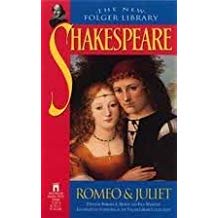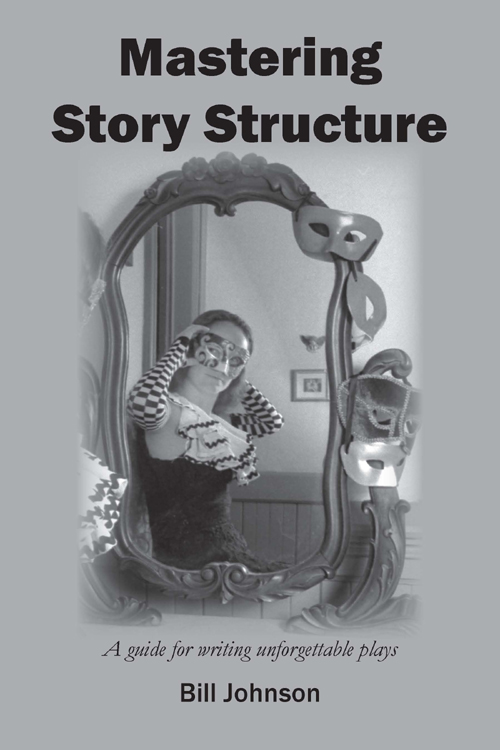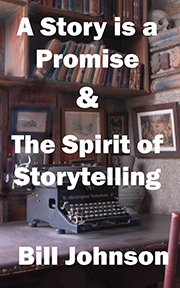|
|
| About the Author |
|
Vita Film Scripts Q/A |
The Power and Passion of Love and Hate
A Review of William Shakespeare's
Romeo and Juliet
by Bill Johnson This review uses The New Folger Library edition of the play.

|
|
This review explores how Shakespeare structured this story and brought it to life.
Romeo and Juliet opens with a prologue announcing the story's star-crossed young lovers will die and their deaths reconcile their warring clans. Shakespeare opens his story by boldly announcing the climax of its plot. How can he get away with this? Because the better the storyteller, the stronger their understanding that a story is a journey. That a well-told story makes every step of that journey engaging and dramatic, more than the sum of its parts. Shakespeare can do what most inexperienced writers would be loathe to do -- give away his ending -- because what makes his story satisfying is a separate issue from the mechanical working out of its plot.
Further, by telling the audience the story's outcome, Shakespeare gives the story a poignancy it would lack otherwise. Knowing the lovers will die makes their every step toward that fate more deeply felt. This speaks to that issue of drama being not only the anticipation of action, but the feelings and thoughts that anticipation arouses.
Act One
Scene One
Act one opens with some of the men of Capulet clan meeting on the street men of the Montague clan. A brawl erupts, citizens join in, and the heads of the houses of Capulet and Montague come upon the scene. The Prince of the City arrives. His judgment, if there is more fighting, those guilty face death.
The dramatic purpose of this scene is to introduce that the families are bound together by an ancient blood feud that has grown to a lethal hatred. The scene does this through a measured introduction of characters that always gives the audience time to assimilate who a particular character is, their personality, and their relationships to other characters.
On a story level, because this story is about a conflict between love and hate, introducing the hate that fuels the story's action also sets the story into motion.
In the aftermath of the brawl, a question arises to the whereabouts of Romeo, a young Montague. It comes out that Romeo has been shedding tears and avoiding his kinsmen, but why is unclear. It is left to Benvolio to discover the cause of Romeo's distress.
Story note, the play opens with some hotly contested action that sets up the retribution further conflict will bring. There's clearly something at stake if anyone from either household engages in more brawling. Second, Romeo is mentioned in a way that it's made clear before his arrival he has issues he's dealing with. Because it's made clear he has an issue to resolve, he is a character who is "ripe" even before he appears. The story's audience anticipates some outcome to Romeo's issues.
Romeo enters as the others exit. It comes out quite quickly that Romeo is lovesick. "Out of her favor where I am in love."
Story note, the dramatic purpose here isn't to withhold that Romeo is lovesick.
Scene Two
The Senior Capulet enters, mentioning the ban on any further fighting and that it should be easy to uphold. Note how Capulet's words will come back to haunt him. During this scene, Count Paris reminds Capulet of his desire to wed Juliet, not quite fourteen. Capulet wishes that Juliet be older before she weds, but Paris presses his suit. Capulet invites him to a party that night, and they exit.
Story note, our introduction to Juliet offers a sense of who she is. Further, that Juliet's life is at a moment of potential transition, i.e., she's a "ripe" character.
Enter Benvolio and Romeo, still caught up in his love sickness. They immediately come upon a servingman sent out by Capulet to announce the party to those on a list he cannot read. He asks Romeo to read the list. It comes out that Rosaline, for whom Romeo pines, has been invited to this party. The servingman, grateful to Romeo for reading the list, invites him to the party as long as he's not a Montague.
Benvolio suggests Romeo go, that seeing some of the town's other beauties aid his recovery from his infatuation with Rosaline.
Romeo answers, defending Rosaline,
"One fairer than my love? The all-seeing sun
Ne'er saw her march since first the world begun."
Story note, note the speed and ease with which the author has set up Romeo to attend this party. He's even prodded into it by Benvolio. Since to advance the story means bringing together its principals, Shakespeare designs the play to make that happen.
Through these opening scenes the author maintains a measured, brisk, pace that introduces the principles and their issues. He now begins bringing them together in a way that escalates the story's dramatic tension. Romeo going to a party at the Capulet's is inherently dangerous.
Scene 3
This scene opens with Lady Capulet, Juliet's nurse, and Juliet. The nurse is a folksy, humorous character. She ends a long answer to a simple question with the hope she live long enough to see Juliet marry. That becomes the lead in for Lady Capulet to broach her parents desire she consider marrying Paris. Juliet's answer,
"I'll look to like, if looking liking move.
But no more deep will I endart mine eye
Than your consent gives strength to make it fly."
They exit to attend the party.
Story note, again the measured, brisk pace of introducing characters and their issues.
Scene 4
When Romeo, Mercutio, and Benvolio enter the party, it is a masquerade, which means they do not have to announce who they are, nor are their faces visible. Romeo and Mercutio pause to talk about dreams, then Romeo says,
"I fear too early, for my mind misgives,
Some consequence yet hanging in the stars."
Something about this moment troubles him, but he goes forward.
Story note, to have Romeo and company pause before entering the party allows the drama over what will happen to build for the audience.
Scene 5
Capulet welcomes Romeo and company to the party. Romeo sees Juliet and exclaims,
"O, she doth teach the torches to burn bright!"
Story note, Romeo falling in love with Juliet is the purpose of this scene, so it is not delayed. The question now becomes, what will be the outcome of this?
Many writers struggle because they build up to a moment of dramatic tension and then cut away. Shakespeare begins a scene with dramatic tension and quickly works to heighten that tension to a higher release point. It's a subtle point to understand, but a major fault for inexperienced writers is cutting away too early from the tension they create.
Tybalt, who crossed swords with Benvolio in scene one, hears Romeo's voice and sends for his sword. The elder Capulet orders Tybalt to stand aside, and even praises Romeo. Again, an act that will come back to haunt him. Tybalt protests, but Capulet rebukes him and orders him to not upset the party.
Romeo takes Juliet's hand and speaks to her,
"If I profane with my unworthiest hand,
This holy shrine, the gentle sin is this:
My lips, two blushing pilgrims, ready stand
To smooth that rough touch with a tender kiss."
Story note, it is the purpose of the scene to show how quickly and deeply Romeo falls in love with Juliet. It is not delayed, nor does it happen off stage.
Juliet is quickly swayed by Romeo's passion. Juliet,
"Good pilgrim, you do wrong your hands too much,
Which mannerly devotion shows in this;
For saints have hands that pilgrims' hands do touch,
And palm to palm is holy palmers' kiss.
Romeo kisses Juliet, then again.
Juliet's nurse calls her away, and Romeo learns from the nurse that Juliet is of the house of Capulet. Romeo,
"O dear account! My life is my foe's debt."
Again, the author maintains his brisk pace of setting up and advancing the story.
Juliet, on learning Romeo's identify, speaks,
"My only love sprung from my only hate!
Too early seen unknown, and known too late!
Prodigious birth it is to me
That I must love a loathed enemy."
This is the end of act one. All the major elements are in place. The hatred of the Montagues and Capulets. That Romeo is lovesick and in love with the idea of love. The fate of what will befall the next person to disturb the peace. And now Romeo and Juliet in love. The curtain closes on a note of high drama and feeling. The storyteller has brought the audience to this height of feeling by potently and directly putting into play the elements of the story. Very little is withheld for some far off plot effect or revelation. What's important to setting up and advancing this story has been presented in a clear, dramatic way with poetic grace and wit.
In a script written by a struggling storyteller, one could imagine the brawl that opens Romeo and Juliet being the climax of act one. Because Shakespeare had a clear sense of his story and how to escalate its drama, he doesn't delay setting out the conflict that fuels it. In this story, if Shakespeare writes that one character doesn't like another, one can surmise they will meet in either that scene or the next. Because of this arrangement of the story's elements, the play's audience develops a sense of trust the author won't introduce characters for no clear dramatic purpose, introduce information but delay its import.
When Romeo is introduced, he is already lovesick, and very poetic and direct about it. What he's feeling isn't withheld to create a revelation at the end of act one. Because it defines Romeo, it comes out in his opening scene. Further, the dramatic purpose of his introduction isn't to make a statement about the kind of character he is. It's to show a young man in the anguish of first love that will quickly be tested. This speaks again to that issue of trust that develops between a writer like Shakespeare and his audience, because one trust Shakespeare to move the story forward dramatically.
Further, Shakespeare writes every moment of every scene to bring out its drama, texture and poetic richness. If a character is angry, they speak of that; lovesick, they speak of their heavy heart; vengeful, they speak of the joys of vengeance. Each moment he creates heightens the drama of that particular moment. The struggling writer is forever doing what I call "describing the furniture." Describing characters, events, environments as if from rote, while the dramatic richness of what should be the heightened moments of a scene are held back for some revelation or plot effect. Shakespeare is both a master of the moment, the scene, the act, the story. He presents passionate, feeling characters in full flower, not as seeds set to bloom late in the fall.
Wonderful structure for the first act of a play.
 Full reviews of Romeo and Juliet, Hamlet, The Iceman Cometh, and the Heidi Chronicles can be
downloaded from Smashwords for .99,
Mastering Story Structure, A guide for writing unforgettable plays.
This workbook is available as an HTML file and a PDF.
Full reviews of Romeo and Juliet, Hamlet, The Iceman Cometh, and the Heidi Chronicles can be
downloaded from Smashwords for .99,
Mastering Story Structure, A guide for writing unforgettable plays.
This workbook is available as an HTML file and a PDF. Top of page Information about Bill's plays.
